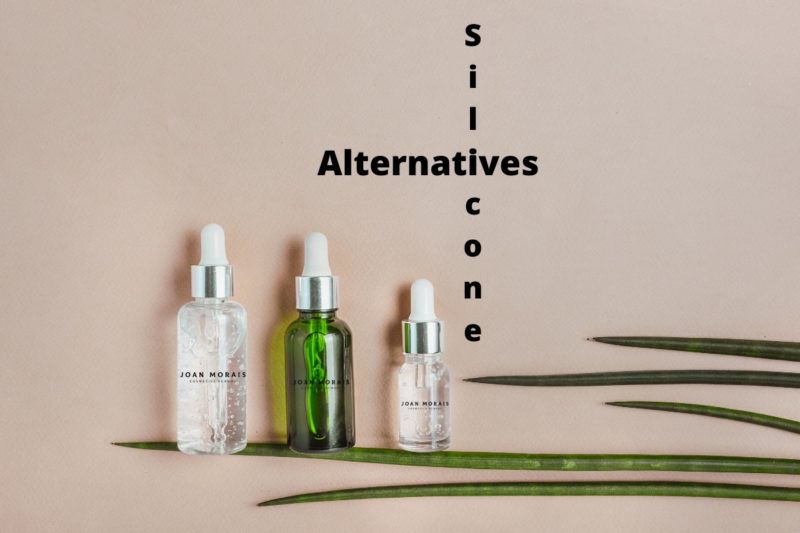
Silicone Alternatives
Silicones like cyclomethicone and dimethicone are a family of synthetic oils with different chemical structures and functions. There are volatile and non-volatile silicones. Volatile silicones provide a light, powdery, fast spreading and drying time and a smooth non-greasy feel. Non-volatile high molecular silicones provide a long glide and slip, add softness, shine and luster with conditioning and a non-greasy feel. It’s all about the sensory properties and a nice feel on the skin and feel and manageability on hair. Replacing silicones in formulations are a challenge for the modern cosmetic formulator to obtain similar sensory properties.
For a variety of reasons, consumers are avoiding silicones in cosmetics due to negative consumer perception Silicones aren’t biodegradable and tend to build up on the hair and skin. Because of this, there is a movement towards silicone-free hair care and skin care products.
Many natural, plant-based, and bio-based silicone alternatives have been developed as alternatives to silicone and more are coming available. Natural Hair Formulators can now use these natural alternatives in place of silicone in their hair formulations and find effective results and similar sensory properties. But, first, the formulator must understand the properties of silicones in order to replace them in a formulation. The Hair Serum post explores using silicone alternatives the the formulation.
Read below to learn more about different kinds of silicones and silicone alternatives.
Dimethicone
Most widely used silicone due to its versatility. Commonly found in many cosmetic including: shampoo, conditioner, styling products, moisturizers, creams, and lubricants.
Dimethicone creates a physical barrier to seal in hydration, keeping skin feeling moisturized and hair frizz-free. In hair care products, dimethicone assists with a smooth comb through on wet or dry hair, reduces frizz with humidity resistance, flyaway hairs, shine and luster and a nice glide and feel on the hair. In skin care products, dimethicone can help fill in lines and wrinkles and soften skin with a nice slip and feel on the skin.
Concerns:
Some are going away from dimethicone because some feel this ingredient isn’t considered sustainable Some have sensitivities to dimethicone or find the barrier it creates can also locks in dirt, oil, and sweat and therefore blocks pores.
Some avoid hair care products with dimethicone, because it can build up on hair and prevent the penetration of moisturizing ingredients.
Research shows that the level of dimethicone found in personal care products is safe.
Cyclomethicone
Commonly used in hair spray, conditioner, sunscreen, and skin care products. Cyclomethicone is lighter with a drier feel, fast spreading and fast drying. It provides a smooth comb through wet or dry hair preventing hair breakage.
Concerns:
Some studies found cyclomethicone a concern for environmental damage. The European Union, starting in January of 2020, does not allow cyclomethicone to be in a wash-off products in concentration equal or greater than 0.1% by weight.
Silicone Alternatives
There are many silicone alternatives available now. Some are only available in large order amounts from large raw material suppliers but there are some available in small order amounts for the Indie Modern Formulator. Here are a few:
- Bamboo Extract
- Daikon Seed Extract
- Marula Tetradecane
- C13-15 Alkane
- Brassica Campestris/Aleurites Fordi Oil Copolymer
- Hydrogenated Ethylhexyl Olivate, Hydrogenated Olive Oil Unsaponifiables
Start a Silicone-Free Hair Care Line
Do you want to learn how to formulate shampoo, conditioner and styling products with natural silicone alternatives that are bio-based, plant-based but effective on the hair? We teach on how to formulate and make hair care products with silicone alternatives in the Pro Natural Hair Care Formulation Course. Start now, and take the course on your time, the course is available as a self-study course.
Learn more about our Self-Study course here.
You might also like


[…] is a synthetic rubber type material, which means it doesn’t contain any natural ingredients other than silicon. The benefit of this is that you never have to worry about bacteria or mold growth on the utensil […]
What are the ‘cone alternatives?
Hi Jan,
Can you clarify what you are asking? The silicone alternatives are listed in the lesson Silicone Alternatives.
thank you for all the valuable information! Which of them do you regard as the most effective silicone replacement? Also what is the maximum percentage you would use in a conditioner?